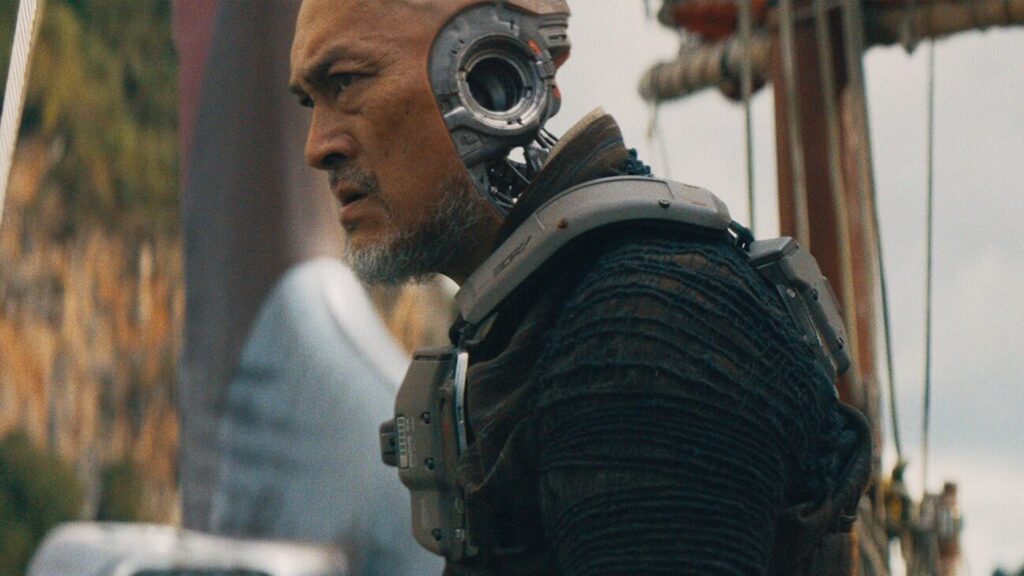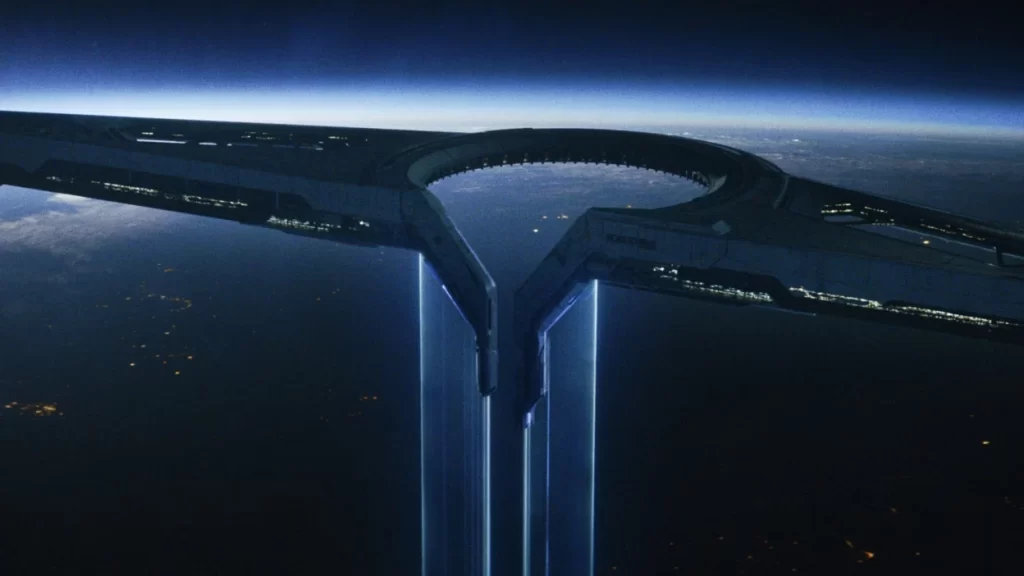
Noisy, clunky, and conventional, Gareth Edwards’ The Creator is a disappointing folly. Yet it is also a worthy endeavor, attempting to wield boisterous blockbuster filmmaking in the service of an original, idea-driven story. It could have been great, if only it were good.
Originality is relative in mainstream cinema. It’s commendable that The Creator isn’t formally rooted in existing intellectual property; the screenplay, by Edwards and Chris Weitz, actually invents new characters and conceives its own quasi-apocalyptic future. It also exhibits minimal interest in jumpstarting a franchise, instead telling a complete and self-contained story. (Of course, Disney might have demanded otherwise had the film been commercially successful; in that regard, early box-office receipts indicate the studio has nothing to worry about.) At the same time, it borrows liberally (one might say shamelessly) from numerous science-fiction touchstones—most obviously Blade Runner and its sequel, 2049, but also the Terminator pictures, Star Wars, and plenty more. It’s a putatively original movie that nevertheless feels recycled, as though an algorithm spat out a vague approximation in response to the prompt, “new-age sci-fi entertainment.”

The genericism of The Creator is dispiriting, but it doesn’t mean there’s nothing new to see here. Edwards, who brought pop savvy to his prior franchise works in Godzilla and Rogue One: A Star Wars Story, is an imaginative stylist with a talent for operating on a large scale. His most fearsome fabrication here is Nomad, a mammoth interstellar vessel that prowls the skyline and periodically emits brilliant beams of pulsating blue light before blasting missiles toward designated areas with merciless precision. Nomad, whose name is surreptitiously revealed on a hangar’s wall to be an acronym (for North-American Orbital Mobile Aerospace Defense), is presumably a product of computer generation, but its celestial presence feels chillingly tangible and plausible—a logical outgrowth of our obsession with technological might.
Which, as it happens, is the movie’s token thematic concern. The Creator takes place in a dystopian future (is there any other kind?) in which humanity has declared war on artificial intelligence following a computer program’s Judgment Day-style strike on Los Angeles. Losing both loved ones and limbs in that explosion was Joshua (John David Washington), an operative tasked with infiltrating the machine enemy’s inner sanctum—an opening title card informs us that they worship a digital deity called Nirmata—by cozying up to Maya (Gemma Chan), a “New Asian” beauty with a nebulous connection to the robotic resistance. Naturally, Joshua falls in love with Maya (did I mention she looks like Gemma Chan?), only for his duplicity to be exposed during a deadly raid, leaving him a man without a wife, a purpose, or a country.

Credit to Edwards for efficiency: All of this happens in the movie’s first 10 minutes. The Creator ultimately sags under its own weight—its endless climax in particular is clanking and dull—but early on it churns through exposition without undue ceremony. That may be because Edwards is more interested in building his world than in defining his characters, which suggests that he recognizes both his strengths and his limitations. Sure, The Creator’s universe of warring clans isn’t appreciably different from any other sci-fi epic, but Edwards nonetheless imbues it with an impressive level of detail. He may prioritize brawn over brains, but his special effects work equally well at the micro level. This is most notable in the picture’s creation of “simulants,” a race of cyborgs who—depending on your perspective—either represent an existential threat to mankind or are victims of an imperialist crusade. They pretty much look like people, except that their ears have been replaced by whirring silver circuitry and the backs of their necks are just gone, with their heads and torsos connected by slender metallic rods. These lifelike androids (one is played by Ken Watanabe) move with remarkable fluidity, and their seamless corporeal concreteness is a quiet triumph of visual design.
But about that issue of perspective. Much like Avatar, the narrative and moral arc of The Creator involves Joshua gradually questioning his loyalty to his military superiors (played by the reliably gruff pair of Ralph Ineson and Allison Janney), and wondering whether the rebellious force he’s been charged with defeating is in fact a righteous sect facing unjust persecution. The picture’s sympathetic depiction of androids has led some critics to accuse Edwards of painting the entity of artificial intelligence in an unduly positive light—a damning claim, given the looming danger that AI presents to the movie industry (not to mention the world). I’m skeptical of this reading—not because I’m confident Edwards has fully reckoned with its thorny implications, but because I doubt he’s thought about them at all. As befits the film’s boilerplate characterizations, the simulants could represent any unfairly targeted minority; what matters about them isn’t that they’re machines, but that they’re misunderstood.

This dynamic is meant to achieve emotional clarity once Joshua encounters a simulant child, whom he christens Alphie and who is portrayed with adorable precocity by Madeleine Yuna Voyles. Despite looking like a cherub—we first see her watching TV while clutching a stuffed animal—Alphie is rumored to possess the uncanny ability to destroy Nomad, meaning Joshua is ordered to exterminate her. He does as he’s asked without question, and then the movie ends.
Just kidding. The obligatory closeness that instead develops between Joshua and Alphie may be predictable—among other things, it recalls the grudging partnership between Hugh Jackman and Dafne Keen in Logan—but it isn’t without its heart-tugging pleasures; in one nicely written scene, Joshua informs Alphie that “you need to be a good person to go to Heaven,” and she surmises that neither of them is eligible because he isn’t good and she isn’t a person. Yet on the whole, the relationship gestures toward tenderness without attaining it, robotically pushing the pair toward each other but never etching their interactions with any texture. That’s true of the movie’s approach to characters overall; Joshua’s ardor for Maya is symbolized by that most hackneyed of flashback montages—a smiling frolic on a beach—while the other figures on screen scarcely receive any personality whatsoever.

The images, thankfully, remain thoughtful and vibrant. For all its bombast (much of it happily provided by Hans Zimmer’s robust score), The Creator supplies some clever moments far removed from traditional set pieces. In one scene, Janney’s colonel temporarily downloads the consciousness of a dead grunt into the body of a simulant in an attempt to acquire critical intel, only for the resurrected soldier to panic and plead for his wife. Later, a hectic sequence on a bridge transforms into a moment of breathtaking stillness when Alphie turns a rampaging marauder into a faithful supplicant. The movie’s journey is largely prosaic and programmatic, but these bits of ingenuity invest it with variety and color.
Until they don’t. As The Creator wears on, its hollowness grows more apparent, and its spurts of imagination evaporate. It seems churlish to inveigh too severely against the picture’s final act, which abandons sly creativity in favor of tedious pyrotechnics and hokey contrivances. (A fake death would be a deplorable feint if it weren’t so obvious.) But the drudgery of the finale reinforces the movie’s fundamental phoniness. The Creator purports to be a departure from blockbuster typicality, but it ultimately expends its energy in the service of solidifying Hollywood conventions. Its intelligence isn’t the only thing about it that’s artificial.
Grade: C+
Jeremy Beck is the editor-in-chief of MovieManifesto. He watches more movies and television than he probably should.
